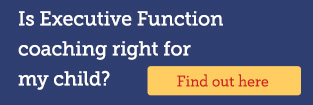I love being an Executive Function coach and find it extremely rewarding. One of my favorite aspects of coaching is working with students of all ages whose needs vary greatly. I particularly enjoy the challenge of working with resistant students who may not yet see the benefit of academic coaching. At times, I have students who may refuse to work with me during a specific session or will not agree they have an issue. That’s okay, I don’t take it personally. It can be difficult for students to gain insight into their behavior or to accept help. The greatest satisfaction I get is watching my students progress, develop more self confidence, and make positive changes through Executive Function coaching.
working with students of all ages whose needs vary greatly. I particularly enjoy the challenge of working with resistant students who may not yet see the benefit of academic coaching. At times, I have students who may refuse to work with me during a specific session or will not agree they have an issue. That’s okay, I don’t take it personally. It can be difficult for students to gain insight into their behavior or to accept help. The greatest satisfaction I get is watching my students progress, develop more self confidence, and make positive changes through Executive Function coaching.
An Executive Function Coaching Success Story
One of the students that I have been working with for several months has made enormous progress, which inspired me to write this article. Have you ever watched someone take small steps in the right direction to make changes? There is nothing more rewarding than witnessing this first hand. Jeffrey, a high school student, is a smart, conscientious and kind individual. His parents are his greatest fans and want the best for him, but it has not been an easy road to success. When I first met Jeffrey, he appeared sad and withdrawn. It was hard for him to make eye contact and he was a little resistant to my help. His parents were extremely concerned about his well being. I heard them say, “He is so bright, but can not seem to plan in advance and stays up to all hours of the night getting work done; we are worried that he is not happy.” Even waking up in the morning and getting to school was a challenge for Jeffrey on some days. Immediately, I knew I needed to help Jeffrey to realize his potential. I was impressed at his strengths in math and science. Continuing to acknowledge and identify his strengths helped Jeffrey in the short term to emerge from a negative cycle.
Tackling Executive Function Challenges
The main Executive Function challenges Jeffrey struggled with were planning and prioritizing his homework, time management and organization. Regarding planning and prioritizing his homework, at first, he did not realize these were important skills to help him manage his workload. After several months of working with Jeffrey, however, he began to express feelings about needing to plan and prioritize his homework better. Since his grades had dropped due to handing assignments in late, he realized that it was time to implement strategies into a weekly routine. He saw the benefit of a structured homework schedule we created and indicated it helped him to plan for short term and long term projects. He also acknowledged that weekly checks-ins with me were needed to continue to help him maintain these new habits. Planning for long term papers or projects continues to be a work in progress, but he is no longer staying up until 2am working on them and instead he usually goes to sleep at a reasonable hour. This change has been comforting to Jeffrey’s parents and has resulted in a boost to his GPA.
Time management was an obvious challenge for him. He would sit at the computer for hours at a time, alternating between playing video games and writing an essay. Of course that’s not the best idea, but video games are more fun than writing an essay, right? Early on, I introduced him to the 30/30 app on his iPhone. This app helps people work on a task for up to 30 minutes, after which they take a short break. We often laugh about this because 30 minutes does not seem like a long time, but somehow it’s easier to be productive for shorter stretches than sitting for three hours straight at a computer without any movement breaks.
Initially, Jeffrey somewhat understood the need to change his organization habits, but he had no idea how to make that change on his own. Being disorganized was a way of life. His ripped or crumpled papers were always in the wrong binder or loose in his backpack. For Jeffrey, this was the norm and using folders was not a priority. He would often state, “I know where everything is, I don’t need to re-organize my papers.” The organization piece took longer to improve during coaching and he realized that old habits are indeed very hard to break. He now uses folders for his papers and understands he needs to clean up his room more frequently. While this may be an area he needs to continue working on, he now has some skills to use for the long term.
Changing a Student's Mindset: The Key To Behavior Change
During our time together, Jeffrey became less resistant to help and began to take steps toward changing. He works well with a lot of praise, feedback and encouragement. His attitude and demeanor have changed dramatically since I began coaching him a year ago. He now appears more cheerful and talks openly about his week with me at the start of our sessions. At times, Jeffrey talks more than I do, which shows me how engaged he is in this coaching relationship. He became open to learning about using effective coping mechanisms when he felt stressed or overwhelmed. I taught him to focus on positive self-talk and continue to move forward even when there is a setback. As a coach, I use strategies that are tailored to help Jeffery make effective progress, such as helping him to develop specific plans, encouraging him to take small steps toward his goals, and providing empathy while listening carefully to his perspective.
How Executive Function Coaching Benefits Children and Parents
Jeffrey’s parents’ views and expectations have also changed. They notice tremendous growth in their son and feel relieved and excited about the positive changes. They tell me that he seems happier and more confident. It took time, but they acknowledge that real change is sometimes a slow process. Through my discussions and updates with them, Jeffrey’s parents have developed a better understanding of his world, which resulted in improvements in the parent-child relationship.
In the next couple months, as the school year wraps up, I am looking forward to watching Jeffrey progress and continue to thrive. The third term ended with Jeffrey and his parents being very pleased with his grades. We have recently discussed Jeffrey applying to colleges and visiting schools. The fact that Jeffrey is excited about college indicates that he has developed a positive outlook. He’s a very different young man now, and it’s incredibly rewarding to know that I’ve played a role in his transformation.
Click below to find out how an Executive Function coach could help your child.
Rachel Kalinsky is a Senior Level Executive Function Coach, Outreach Coordinator and Supervisor with Beyond BookSmart. With over fourteen years of experience as a school psychologist, Rachel has worked with students of all ages with significant social, emotional, behavioral and/or learning disorders. Rachel worked as an Evaluation Team Leader for several years as well. Rachel is also a very active member of the Board of Directors for the Massachusetts School Psychologist Association and attends local and national conferences several times a year. Rachel graduated from University of Albany, SUNY with a Bachelors degree in Psychology and Education. She went on to complete her graduate work at University of Massachusetts Boston where she earned a Masters degree and a CAGS in School Psychology. Rachel believes that every student is unique and can be successful when he or she understands his or her strengths and individual learning style.

